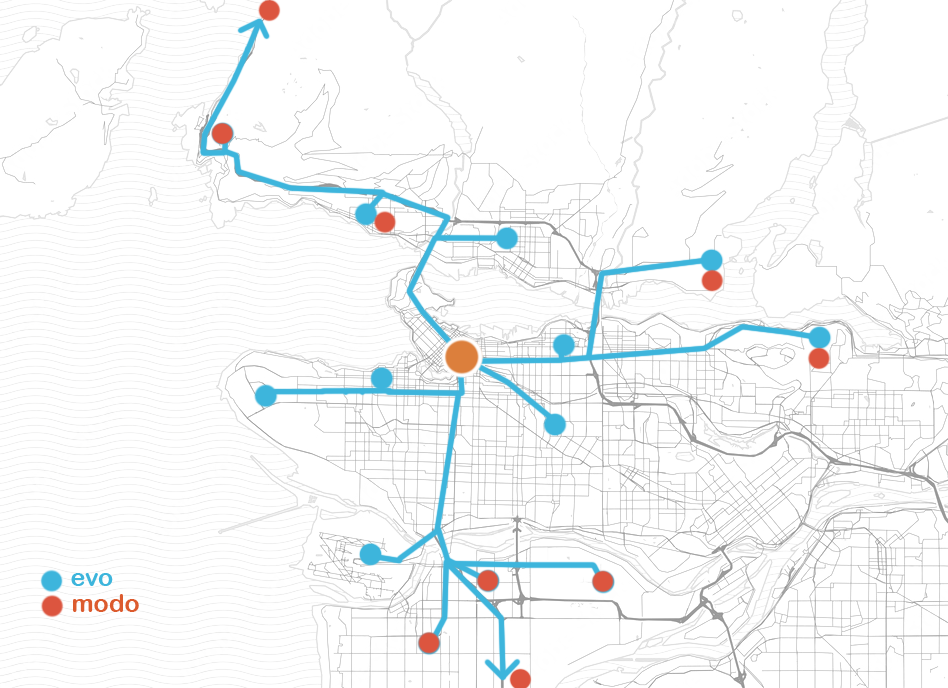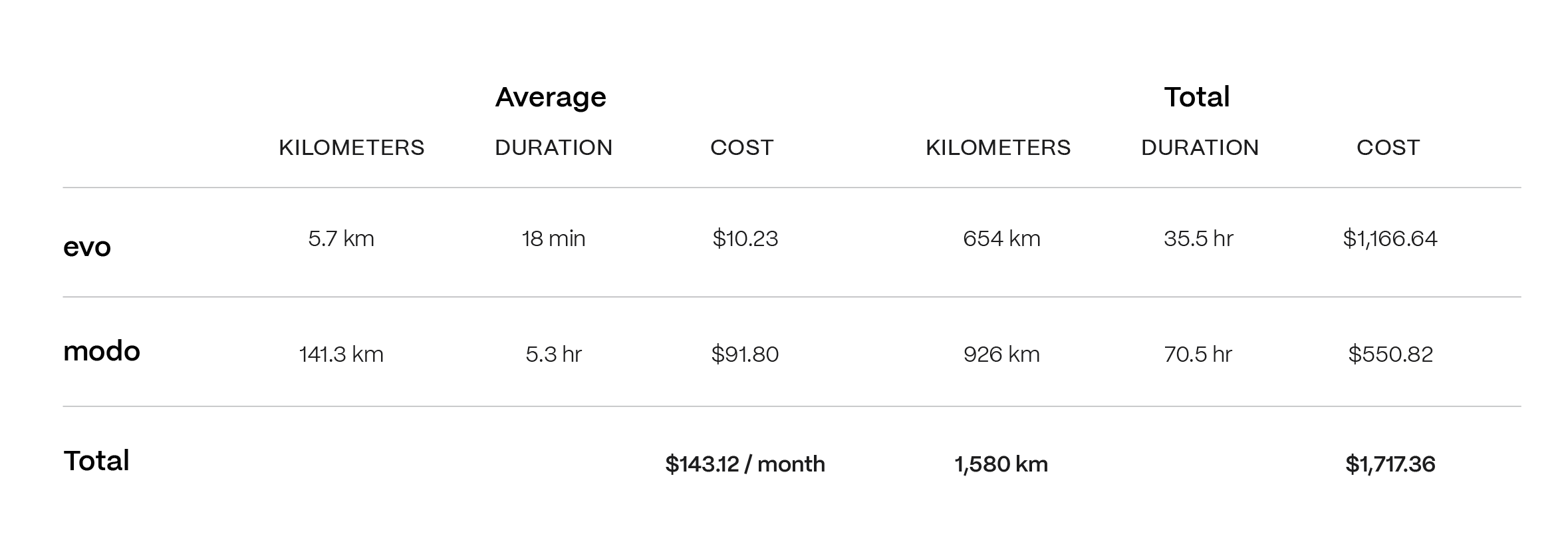(Car) Sharing is Caring
By Yann Trégoat
Ever since my partner and I moved to Vancouver in 2021, the topic of buying our own car has come up quite a few times. Thanks to our Evo and Modo subscriptions, we have resisted the temptation so far, but it seems like the conversation keeps coming back up.
Prior to moving to Vancouver, we both lived and worked in Amsterdam. One of those cities where cycling is the norm, taking transit is an alternative, and driving is an anomaly. So, we never had to think about driving and even less so about getting a car while we were living there. However, as soon as we moved here, driving to places became unavoidable, and we started having debates about whether we should buy a car or not.
Now, I know this question can have very different outcomes depending on one's lifestyle, background, and household situation. It is fair to say that for young downtowners with no kids like us, the debate about car ownership is easier to have than for a family of 4, living in a more suburban setting. But as much as our lifestyles shape our commuting habits, I like to think that the opposite is also true. And in an era where everything is becoming more unaffordable by the day, changing habits on big spending items can make a significant difference.
In Vancouver, the number 1 spending item, aka housing, is unfortunately already out of reach for most of us, so there is not much to save there. But the next big item that people can save a lot on is, interestingly, not giving up on their daily $10 Starbucks, but rather saving on transportation expenses. And as much as working from home is a game changer in that regard, it is still very anecdotal compared to car-related cost savings. Naturally, the biggest saving of all is not having a car in the first place. Imagine a reality where you can drive whenever and wherever you want, but you don’t have to pay the 20-50k upfront cost, you don’t pay for insurance every month, you don’t pay for parking, maintenance, registration fees… or even gas!
My partner and I have been using Evo, and more recently Modo, for more than two years now. We are careful and aware of our spending on both subscriptions, but we never limit our travel plans due to cost. We use these cars as much as we would our own personal cars, and we are pretty convinced that we are saving hundreds, if not thousands, of dollars by doing so.
However, we still occasionally have slightly heated debates about the actual convenience vs. cost comparison between car sharing and owning. Some people have relatively good arguments about why having a car is not much more expensive while procuring a certain freedom and peace of mind that car shares cannot offer.
So, at the end of 2023, I decided that I wanted to know exactly what the cost of our car share usage was. I needed to see how much we were supposedly saving. Maybe I was wrong? Maybe it wasn’t a good deal. It was really hard to grasp, especially in the long run. So, I gathered all our trip data for the year and compiled them into a single spreadsheet. The main goal was to see how much it cost us to drive that year and to analyze our trip patterns. Then, to spice things up, I compared that data with the average cost of car ownership in Canada.
Using car shares (our 2023 Wrapped):
In 2023, we drove a total of 1,580km for a total amount of $1,717.36. That is equivalent to $143.12 monthly fee, everything included (even gas).
We completed these 1,580km through 118 trips:
87 trips were under 5km (our usual hangouts between downtown and Kitsilano or downtown and Boundary road)
4 pick-up trips from downtown to YVR (around 25km round trip)
9 trips in the greater Metro Vancouver area (25km to 75km round trip)
4 trips to the mountains ranging between 75km to 470km round trip
Detailed usage numbers:
Compared to owning our own car:
According to a Ratehub.ca post by Jordan Lavin, the updated January 2024 total cost of car ownership in Canada is $1,387/month or $16,664/year. The calculation is based on the most average Canadian family car: a Toyota Rav4. Depreciation and financing interests account for around 57% of that spending ($790/month). Parking and gas account for nearly 30% ($415/month).
Now, it’s very obvious that this comparison is a theory. In practice, your car capital cost depreciation and running cost might vary dramatically from this average number. Your driving routines and your habits can sensibly affect the end result as well. But wow… let’s look at this for a second.
We paid around $1,700 for the entire year while owning our own car would be $1,300 per month! Just looking at our monthly cost of $143, that’s about a 3rd of what we would pay for gas and parking only.
But overall, the number that strikes the most is the $14,500 we saved. This is insane!
To give a sense of scale, that amount of money can get you 4 round trip Business Class tickets from Vancouver to Paris. Or alternatively, it could cover your daily Starbucks for almost 4 years!
Apart from these numbers, I do not have a clear conclusion for this study. I hope everyone can look at them with their own judgement. I also think it is healthy to bring some perspective to a lifestyle choice many of us take for granted. Car sharing is a system that works great for us and could work very well for many more people in the city.
Ultimately, maybe this study is a reminder that we should be thankful that these alternatives exist and that we should praise them so that they reach more people and become even more affordable. Car sharing is not only better for our wallets, but it also makes our cities cleaner and more equitable. It is decluttering the roads and sidewalks, as well as decluttering our minds by relieving us from all the mental charge that comes with car ownership. Personally, I think we’re sticking with car shares not just for the cost but also for the convenience and peace of mind they can offer. And for as long as we can make it last, I think we wouldn’t have it any other way.
Bonus:
For our fellow junior and experienced car sharers, here are a few Evo and Modo tips that our little study revealed:
Overall, Modo has lower average rates than Evo, making it more appealing for short return trips from your home or place of work. All it needs is a little bit more planning.
While Modo is cheaper and more convenient for long trips (>3hrs), it is not always cheaper than Evo on long trips with a lot of kilometres (>200km). So, if you’re planning on a long trip not too far (IKEA), choose Modo. And if you’re planning on a long trip with a lot of kilometres (Whistler), you’ll end up paying less with Evo’s daily rate ($105) or even with some good deals at a rental company.
Booking a Modo truck or minivan for a couple of hours might cost you less than renting a small U-Haul
If you’re taking an Evo (or any other vehicle actually) to pick someone up at YVR, tell them to wait for you at the departure level, where traffic is way more fluid. Being aware of minutes spent in your car makes you a smarter driver!
Happy Riding!
Source:
https://www.ratehub.ca/blog/what-is-the-total-cost-of-owning-a-car/



